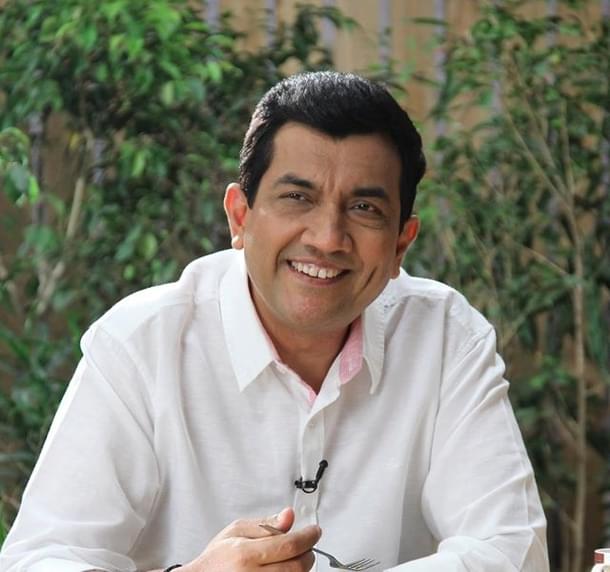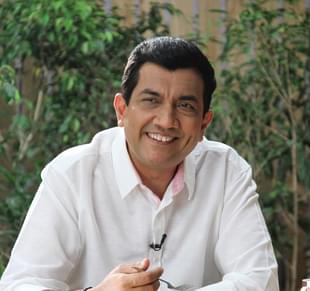Culture
How Sanjeev Kapoor Broke New Ground For Chefs In India
Madhulika Dash
Feb 03, 2017, 07:38 PM | Updated 07:38 PM IST
Save & read from anywhere!
Bookmark stories for easy access on any device or the Swarajya app.


· He is the world’s first chef to co-own a 24/7 food channel.
· He was the first Indian chef to have a website registered in his name
· His technique and speed of filleting a fish is considered even today a benchmark in butchery.
· At 18 plus years in television, he remains amongst the most successful TV chefs – and easily the most recognisable name in the food industry.
· His 36 books (of the 150, which are mostly curated recipes) have sold a whopping 10 million copies.
· The first chef to have his own ready-to-cook line called Khana Khazana
· The first chef to have a cookware segment developed and marketed under his name
· He remains one of the most decorated, known faces of Indian food to the world – and has been a part of CNN’s illustrious list of World Celebrity Chefs.
And yet, none of the above can effectively explain the meteoric rise of the brand and person, we have all come to know (love, adore, dislike but nevertheless admire) as Sanjeev Kapoor. A person extraordinaire and a brand that not only took chefs out of the kitchen, but also made a career in food look cool, why, even aspirational. Thanks to him, we know the difference between a chef and bawarchi, a manager and a server – and we are familiar with writings on food (though still nascent).
On hindsight, one can attribute his initial rise to fame and subsequent achievements to pure luck as the evident push came from the era of the cable TV boom. Thanks to the satellite television boom 18 years ago, there was a Khana Khazana that catapulted the then Centaur Juhu executive chef into a household name. But what many don’t know is that Khana Khazana, which began as an experiment under the name Sriman Bawarchi, was almost gutted to the ground after a few pilot episodes due to a lack of popularity, and a possible channel-production house clash. This was when chef Kapoor, who had shot for one of the episodes along with others, took it upon himself to convince the management to not only give the cookery show a change of name, but air-time as well. For someone not in the know, yet looking for a change, taking on a channel on sheer confidence was a risk that could easily backfire. First, because it wasn’t the first cookery show to go on TV; and second, because Kapoor was still an unknown entity when compared to popular names like Madhur Jaffery and Jiggs Kalra, who already had their TV shows by then.
What many then hadn’t noticed about Kapoor, who decided to do the forthcoming episodes of the season without taking a single penny from the production house, was his perception. Legendary chef and mentor Sudhir Sibal says this about Kapoor:
From his early days in ITDC, he had this unique ability to gauge situations and people and take risks which he saw through with his intelligence and hardwork (if a shift needed 10 hours, he would work 16). What helped was his immaculate personality. Where chefs worked on recognition in the fraternity, through sheer excellence in cooking, Sanjeev came across as an enigma.
He spoke fluently, was always well groomed (his moustache too was trendsetting), had the knowledge and the earned skills and the confidence and intelligence to make things possible. This was the sheer reason that Sanjeev, in spite of never being the top chef in cooking, always remained a favourite when it came to representing the brand or the country – whether it was being part of a team to visit the Rastrapathi Bhavan, going to Moscow or New Zealand to launch restaurants or even get trained under the best of chefs in the world.
It was this very ability that had helped him achieve things, including the successful running of Khana Khazana, that most chefs back in the 80s and 90s could only hope to, like becoming an executive chef of a five star hotel within 10 years of starting his career. A notable career high spot was when he filleted a large quantity of fish singlehandedly. This, along with his habit of walking into the lobby of a five star hotel in his chef coat and torque and interacting with the guests earned him the respect of his peers and seniors.
Chef Kapoor, after managing the affairs of the hotel, shot patiently tending to every whimsical change the director suggested: with an anchor, without an anchor, with other chefs and finally him as an anchor. It was the episode that saw Kapoor debuting as an anchor and chef that was relayed as the opening episode nine times in the weeks to follow. Was it on popular demand? Not really, it was due to a delay in sending the rest of the tapes. And yet as industry experts believe, each time it was aired, the viewership catapulted. What made it a hit? Two things, says seasoned television expert Vinta Nanda, “his easy charm and the knack of keeping it simple.” His first dish, shaam-savera in fact remains a benchmark not only for clever takes on Indian food, but also popularising nouvelle cuisine, which till then was limited to the chef’s kitchen.
The effect of what Kapoor did was evident a few weeks later when he was made a part of the Tara team, a groundbreaking, woman centric serial of the time. The idea, shares Nanda, “was to leverage Khana Khazana as well. But we were mistaken. The crowd in one of the city tours came to see not so much the Tara cast as they were for the chef who made cooking easy. And what could have been a brief presence at every event had to be reworked given his rising popularity.”
Women, across all ages, loved him, says Divya Radhakrishnan, owner Helios Media, who managed Food Food channel’s marketing and sales for a good number of years.
As for Khana Khazana and Zee, the one season wonder went on for more than a decade, with re-runs still in demand, thanks to Kapoor’s perception and sense of ownership. “The amount of knowledge, ideas and network that he gets to the table is incredible. With him around, nothing seems impossible as he finds the way to get it done even before you could think of ways it cannot,” says Gautam Deva, who worked with him in two MasterChef seasons. He feels much of the series’ success was not just due to the celebrity chef’s oratorical ability (he doesn’t need a script and can fill in time speaking on something as simple as dal without repeating a fact) and camera presence (he is known for giving perfect shots in one take). It was something more - the ease with which he offers help – not just in cooking but otherwise as well – if the need is genuine. A proof of this is not only the forums he is a part of but also the two CSR initiatives that he runs to promote woman entrepreneurs besides working with autistic children and also devising meals for schools in villages.
Sabysachi Gorai, who has shared the platform with the Kapoor on many occasions and is an admirer of his work says:
That ability to chaff the faff from the real comes only when someone has built an empire literally out of nothing, single-handedly on sheer hard work, confidence and intelligence. The sheer magnitude of what he has done – not only physically but psychologically too by changing the mindset about food and chefs and the culinary world of India – makes him almost God-like
Quite rightly, given his presence everywhere and his ability to launch careers – even for food writers.
So how does a person who didn’t have a head start or a mentor reach so far – and still stay relevant?
While analysts would put it on Kapoor’s not-so-common ability to captialise on opportunities that he could seek out, chef Vikas Seth, who worked with him on his Youtube channel and a television show has a different take. “He didn’t really have the early bird advantage, be it with securing a cookery show on TV or books or even the product line he sells under his two famous brands, Khana Khazana and Sanjeev Kapoor, people were there before he made his debut.
“He didn’t also have the luxury to break the frame and rebuild another – as a chef you had to cook and make it believable, and bring out a book that had to have recipes – what he did have was the ability to convince, and did so with example. And that is what makes him relatable, even if he is on TV.”
He would never tell you things he doesn’t practise himself, and is pretty vocal about what he doesn’t know, and even those he wants to know. And that mix makes him not only endearing to anyone meeting him, but also speaks volumes of how much of work he still puts in himself to live the image.
In fact, adds chef Gorai, “his complete legacy is based on his ability to set examples: not only how to find opportunities, but how to achieve success in him. And in doing so, he has established what is seen today as a natural progression for most chefs – from top post in hotels to TV to author to entrepreneur to owning your own restaurants.”
And the best part, he has been able to achieve most with sheer intelligence, with sourced finance and a willingness to try and fail rather than not attempt. An excellent example of his business acumen, says Radhakrishnan, “is his own book category that he built after realising that the mantra of the (then unconventional) author’s success in publication is having constant fillers between big releases. And so started the niche based series that saw Sanjeev Kapoor release 150 books in his over a decade long career as an author.” Today, that opportunity is called author sustenance in publishing world – and a norm for most writing on food and otherwise.
For a chef and celebrity whose public appearances are only for work (or supporting a cause or a friend), chef Kapoor has remained much of an enigma, even for those who have worked with him and have been able to decipher a side of this personality that is often summed as: “he is disciplined; he is fit as a fiddle; he is a knowledge storehouse and is up to date; his fascinating persona still makes him stand out in the crowd of whites.”
After all, it takes someone with a star quality to give the food world such a fascinating cool aura. And for that single, significant contribution that changed lives, the perception about food, chef Sanjeev Kapoor deserves the Padma Shri and a generation’s (or two) heartfelt gratitude.
Image credits: facebook.com/ChefSanjeevKapoor
Madhulika Dash is a writer with over 13 years of experience writing features from tech to cars to health. She is also a seasoned food appreciator who writes on Indian restaurants and cuisines across different platforms. She has also been on the food panel of MasterChef India Season 4.





